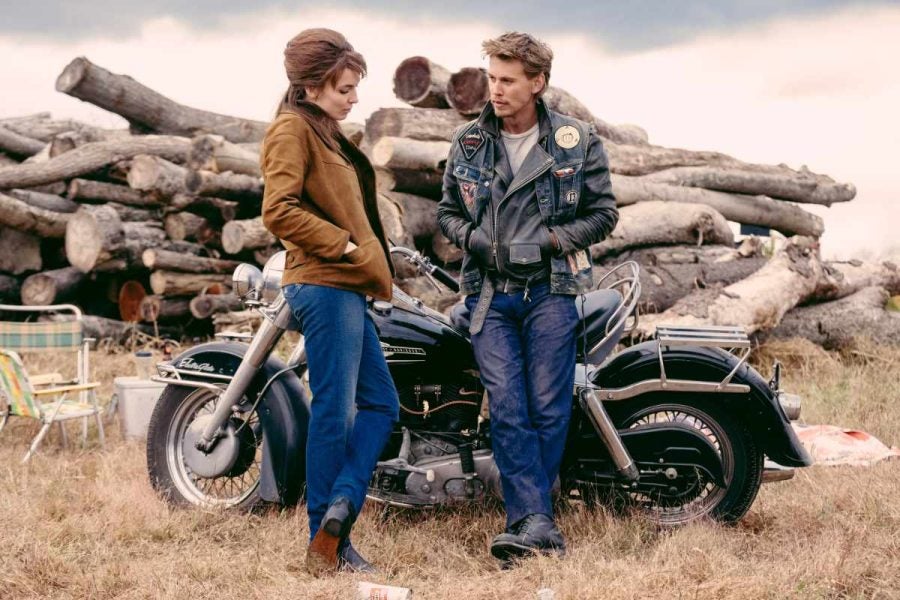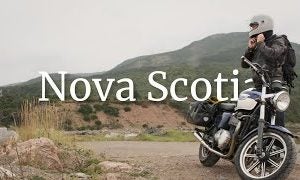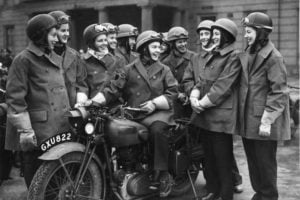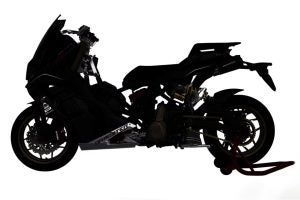It’s been a long time since we had a motorcycle movie hit the mainstream consciousness—the last one I can remember is 2004’s action film Torque. So when I heard about The Bikeriders going into production, I was pretty interested, especially because the book it’s based on has been sitting on my shelf for a while.
The book itself was first published in 1968 by photographer Danny Lyon. It’s based on photos of his time riding with the Chicago Outlaws motorcycle club, and he also included interviews at the back with the one-percenters and their families. The book was much less controversial than Hunter S. Thompson’s Hell’s Angels, and was certainly less sensational in its content. Filmmaker Jeff Nichols got his hands on the book years ago and used it to develop a movie, filling around Lyon’s work with his own narrative inspired by the interviews, photos, and by biker history. There were changes—a fictional club, the Vandals, stands in for the Outlaws—but if you’ve read the book, you can see it’s referenced constantly in The Bikeriders.
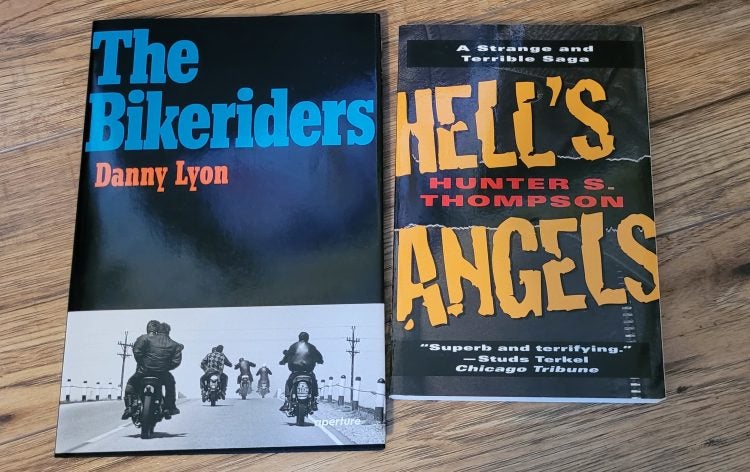
The Bikeriders book was far less lurid and sensational than Hunter S. Thompson’s book, although both dealt with outlaw bikers from the same era. Photo: Zac Kurylyk
Nichols’ film premiered in 2023, but was dropped by distributor 20th Century Studios (Disney) before it hit theaters. Focus Features is now distributing the film domestically in 2024, with Universal handling international distribution.
I say all that to say this: It’s been a long journey to get this story to a theater near you. So should you, in turn, get yourself to the theater to watch it?
I think that depends on what you want out of it.
If you want a bikesploitation flick with gratuitous violence and sex, this isn’t the film. Yeah, there are two-fisted brawls, and worse, but none of that is played up for Tarantino-style shock. And nobody is running around naked, even half-naked. There are no ridiculous drug deals or arms sales going down. This isn’t Sons of Anarchy, not even close. The criminality of the gang is glossed over, just as it is in all those old one-percenter autobiographies, at least until the statute of limitations expires. But neither does it portray all these bikers as folksy heros, like Butch Cassidy and the Sundance Kid. It shows them for who they are. At their best, they’re chain-smoking, drunken scofflaws. At their worst, the club’s worst members are vile and murderous.
It isn’t what I’d call an arthouse piece either, although I really liked the narrative process, using the original book’s interviews as a way of advancing the story. Some of the actors are very good. Jodie Comer does an excellent job of playing a non-glamorous mid-western biker old lady. With his baggy clothes, stocky frame and limited dialog, Tom Hardy looks like the sort of guy who’d run a post-war biker gang, but end up overwhelmed. As for Austin Butler, who plays the lead (I guess), he constantly looks like he’s consciously playing a part, trying to look like every causeless greaser rebel that ever graced the drive-through screen. I’m not sure if this was intentional, and I’m not sure it works, but he’s very recognisable as a stock character in these sorts of films.
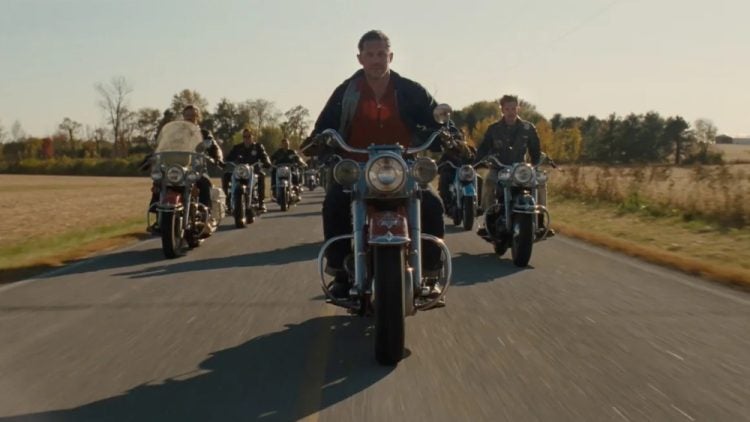
Many of these riding scenes looked like they came from the book’s photos, or Donald Shebib’s 1966 documentary on the Satan’s Choice club in Canada. Photo: Focus Features
Other touches were just a bit off. The music seemed like Nichols was trying to pull a Scorsese here, and I think he misses the mark on the soundtrack. The bikes themselves hardly look like the far-out choppers that one-percenters rode in the 1960s. But it was obvious that he’d put a lot of work into getting very small details right, particularly the description of how the club evolved at the end of the film. Because that’s what this film is really about. Just like Easy Rider is about the end of the American Dream, so is The Bikeriders.
And it’s funny. In Easy Rider, the quintessential bikesploitation film, the lead character Wyatt bemoans the loss of individualism and freedom that is spreading across the US at that point, in the late 1960s. Yet it’s drugged-up long-haired hippies similar to Wyatt who are responsible for the changes in the Vandals at the end of The Bikeriders, as they take control of the club from the short-haired beer-drinking greasers who founded it.
So. If you want to watch a film about biker gangs that doesn’t glorify crime, I think you can enjoy The Bikeriders. Really, it’s more of a romantic drama that isn’t terribly romantic, as it’s set inside a biker club whose membership changes from mere rowdies to morally degenerate rapists, echoing the decline of Western culture. If anything, I would call it a hopeful tragedy, and it’s probably the best thing playing in most theaters right now, although that is admittedly a very low bar.
For whatever it’s worth: I will probably watch it again. The scenes of the Vandals riding around in the harvested cornfields of the Midwest fall were beautiful. It’s mid-summer here in Canada, but those shots made me look forward to the fall, when I’ll be riding the farm roads I grew up on. It’s the first time I’ve seen a Hollywood film that realizes the moto-world doesn’t begin and end in California, and for that reason alone, I’d re-watch it.
Check out your local theater times if you want to watch The Bikeriders on the big screen. It’s not currently streaming, and I think it’s worth the in-person trip to the theater anyway. And if you want to see an actual film critic’s opinion on the piece, Google it. I’m no Siskel or Ebert, nor do I play them on television.


